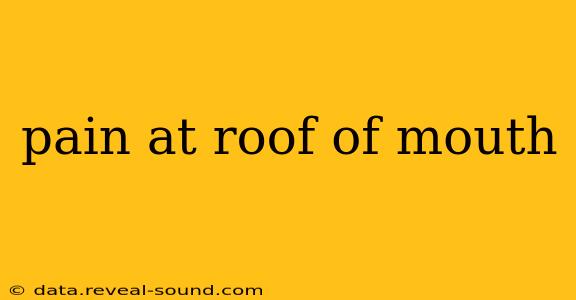Experiencing pain on the roof of your mouth can be incredibly uncomfortable and disruptive. This area, officially known as the palate, is sensitive and prone to various issues. Understanding the potential causes is crucial for seeking appropriate relief. This comprehensive guide will explore the common reasons for palate pain, accompanying symptoms, and effective treatment options.
What Causes Pain on the Roof of My Mouth?
The causes of roof-of-the-mouth pain are diverse, ranging from minor irritations to more serious underlying conditions. Let's examine some of the most frequent culprits:
-
Minor Injuries: Accidental burns from hot food or drinks, biting your palate, or irritation from sharp food particles are common causes of temporary pain. These usually resolve on their own within a few days.
-
Canker Sores (Aphthous Ulcers): These small, painful ulcers are common and usually appear as white or yellowish lesions surrounded by a reddish border. Their cause isn't fully understood, but stress, hormonal changes, and nutritional deficiencies are often implicated.
-
Cold Sores (Oral Herpes): These are caused by the herpes simplex virus and manifest as painful blisters on the lips and sometimes the roof of the mouth. They're highly contagious.
-
Mouth Sores (Stomatitis): This general term encompasses various conditions causing inflammation and sores in the mouth. Viral, bacterial, or fungal infections can be responsible.
-
Thrush (Oral Candidiasis): A fungal infection caused by Candida albicans, thrush often presents as white patches on the tongue, palate, and inner cheeks. It can be painful and is more common in individuals with weakened immune systems.
-
Dry Mouth (Xerostomia): Lack of saliva can make the palate dry and uncomfortable, increasing susceptibility to irritation and infection. Certain medications and medical conditions can contribute to dry mouth.
-
Allergies: Allergic reactions to foods or other substances can sometimes manifest as mouth sores or inflammation on the palate.
-
Oral Cancer: While less common, persistent or worsening pain on the roof of the mouth, along with other symptoms like lumps, difficulty swallowing, or bleeding, warrants immediate medical attention to rule out oral cancer.
What Other Symptoms Might I Experience?
The symptoms accompanying roof-of-the-mouth pain depend heavily on the underlying cause. Some potential accompanying symptoms include:
- Redness and Swelling: Inflammation is a common sign of irritation or infection.
- Bleeding: Bleeding might occur with injuries, ulcers, or more serious conditions.
- White or Yellow Patches: These are indicative of thrush or other infections.
- Blisters: Blisters are characteristic of cold sores or other viral infections.
- Difficulty Swallowing (Dysphagia): This can be a sign of a more serious underlying condition.
- Fever: Fever might accompany infections.
- Persistent Pain: Persistent pain that doesn't improve after a few days should prompt a medical consultation.
How is Pain on the Roof of My Mouth Treated?
Treatment depends entirely on the underlying cause. For minor injuries, simple home remedies like rinsing with salt water or applying ice can provide relief. Over-the-counter pain relievers can help manage discomfort.
For more significant issues like canker sores, thrush, or cold sores, a doctor or dentist might prescribe antifungal medications, antiviral medications, or corticosteroids. In some cases, they may recommend mouthwashes or other topical treatments.
For persistent or severe pain, or if you suspect a more serious condition, consulting a doctor or dentist is crucial for proper diagnosis and treatment.
How Long Does Pain on the Roof of the Mouth Last?
The duration of pain varies greatly depending on the cause. Minor injuries and irritations often resolve within a few days to a week. Infections and ulcers may last longer, potentially requiring several weeks for healing. If the pain persists for an extended period, or if it worsens, it's essential to seek professional medical advice.
When Should I See a Doctor or Dentist?
You should consult a healthcare professional if:
- The pain is severe or persistent.
- You experience bleeding or swelling.
- You develop white or yellow patches in your mouth.
- You have difficulty swallowing.
- You have a fever.
- You notice any lumps or unusual growths in your mouth.
- The pain doesn't improve after a week of home treatment.
Remember, this information is for general knowledge and should not be considered medical advice. Always consult with a doctor or dentist for diagnosis and treatment of any medical condition. Early intervention is key to effective management and preventing complications.
